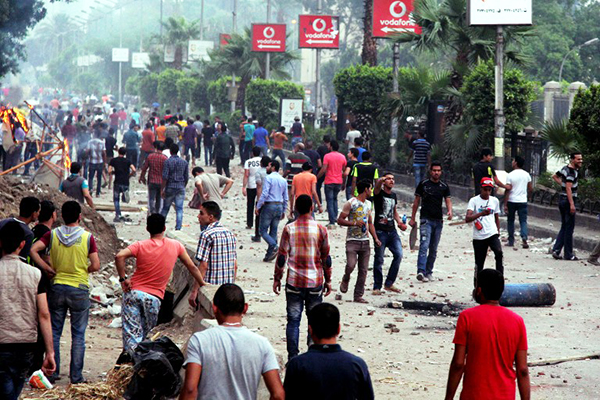
Mohamed El-Shahed—AFP
As the Egyptian crisis evolves, here’s a recap of the last few days.
Recent, key developments in Egypt since millions took to the streets on Sunday to demand the resignation of President Mohamed Morsi, who was elected a year ago:
Sunday, June 30:
- Chanting “Leave!” and “the people want the ouster of the regime,” crowds demonstrate across Egypt in response to a call from the grassroots movement Tamarod (or Rebellion in Arabic).
- In Cairo, protesters gather around the presidential palace and in Tahrir Square, epicenter of Egypt’s 2011 revolution.
- Huge demonstrations also take place in Alexandria, Menouf and Mahallah in the Nile Delta, and in the canal cities of Suez and Port Said.
- The Army speaks of “several million” protesters; a military source says: “It is the biggest protest in Egypt’s history.”
- Morsi supporters rally in the Cairo district of Nasr City. The Army puts their numbers at 25,000.
- At least 16 people are killed nationwide, eight during clashes between government supporters and opposition forces outside the Cairo headquarters of the Muslim Brotherhood, the health ministry says.
- Morsi calls for dialogue, which Tamarod rejects, saying there is no alternative to his resignation.
- Opposition leader Hamdeen Sabbahi presses the Army to support opposition forces if Morsi does not step down.
Monday, July 1:
- Protesters set fire to the Muslim Brotherhood headquarters in Cairo then loot it.
- Tamarod gives Morsi until 1500 GMT on Tuesday July 2 to quit or face an open-ended campaign of civil disobedience.
- The tourism, environment, communications, and judicial and parliamentary affairs ministers resign.
- The Army gives Morsi 48 hours to meet the “people’s demands” or face an imposed solution.
- In Tahrir Square, anti-Morsi protesters erupt in joy on hearing the Army’s statement.
- Morsi’s office rebuffs the Army’s ultimatum, denouncing any declaration that would “deepen division” and “threaten the social peace.”
Tuesday, July 2:
- Morsi holds talks all day with Army chief Gen. Abdel Fattah al-Sisi, the military says.
- The National Salvation Front, the main opposition coalition, says it would not support a “military coup” and trusts the Army statement does not mean it would assume a political role.
- The spokesmen for the presidency and the cabinet quit.
- Opposition groups choose leading dissident Mohamed ElBaradei to represent them in the negotiations called for by the Army.
- Opponents of Morsi pack into Tahrir Square, while his backers join a sit-in in the Nasr City neighborhood, while hundreds gather near Cairo University.
- Clashes between the rival sides leave seven people dead, medics say.
- Gunmen kill 16 people and wound 200 others at a Cairo rally supporting Morsi, health ministry officials say the next day.
Wednesday, July 3:
- Morsi refuses to quit, insists on his constitutional legitimacy, and “calls on the armed forces to withdraw their warning and rejects any dictates, domestic or foreign.”
- Senior military commanders hold emergency talks, a source close to the army says.
- State television is taken over by the Army.
